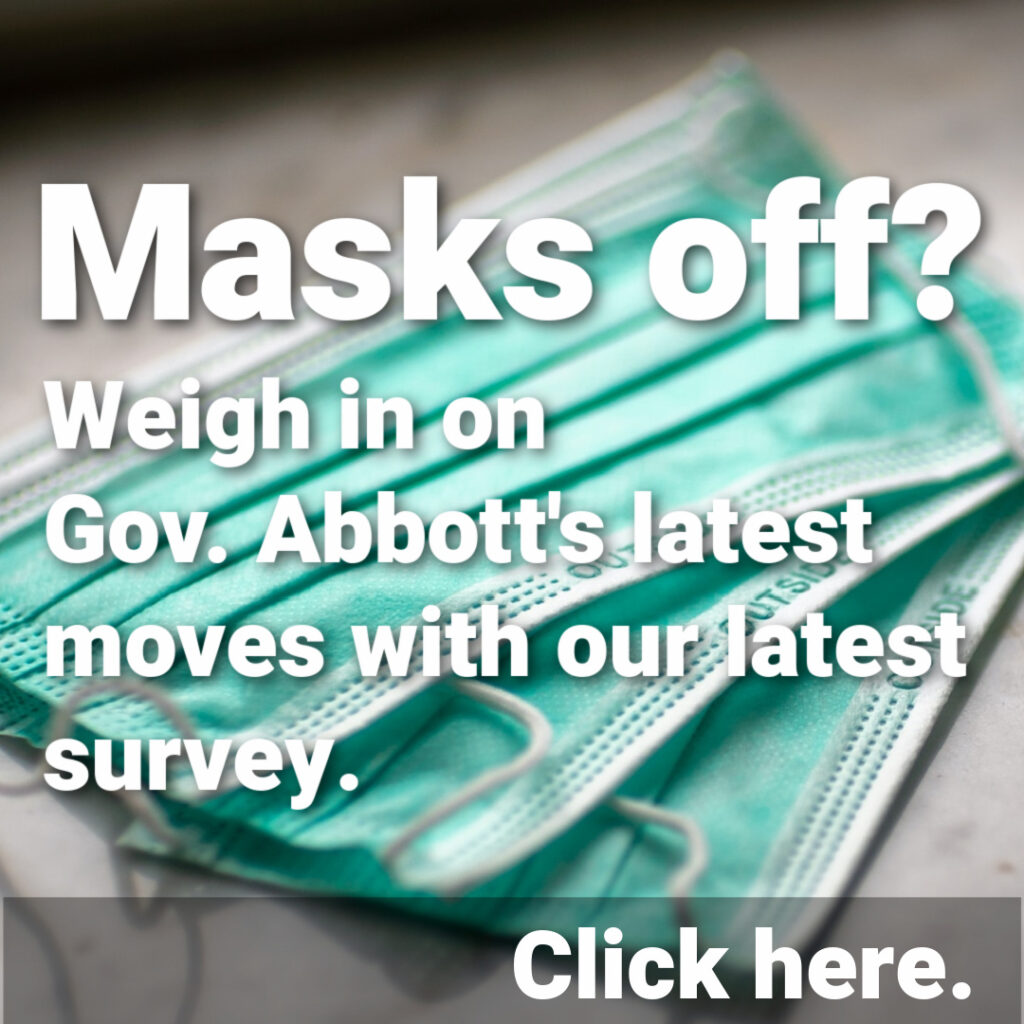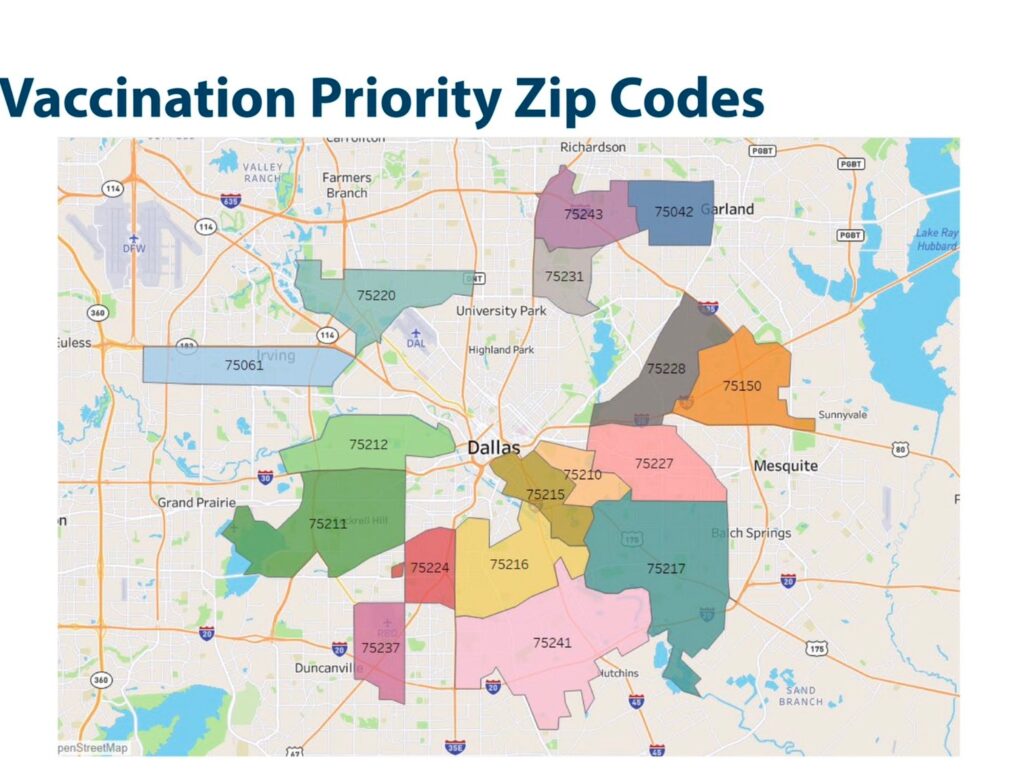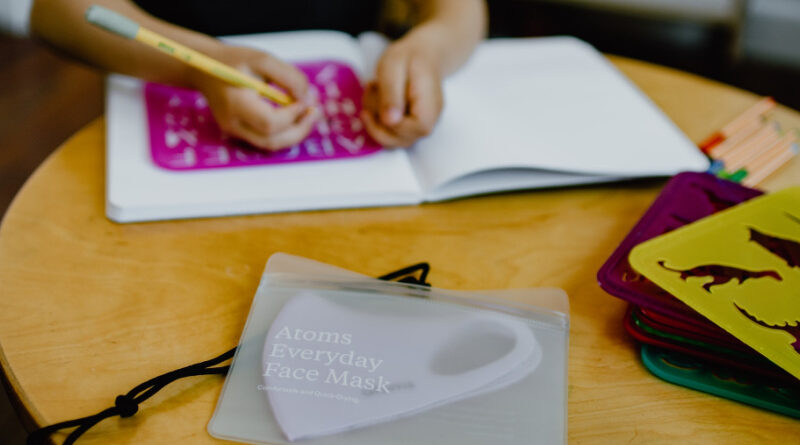Pandemic Schooling Faces New Questions
Schools largely plan to stay course, despite governor’s orders
This story has been updated to reflect additional information about Highland Park ISD’s plans for safety protocols.
Despite Gov. Greg Abbott’s orders to open the state up and the ending of the mask mandate, most area schools plan to stay the course – at least until public health officials tell them otherwise.
The Texas Education Agency announced updated guidance Wednesday that said public school systems’ mask policies can continue unchanged and local school boards have the authority to determine their district’s mask policy.
“Under the new guidelines, a public school system can continue requiring masks; however, the local school board has authority to determine their district’s policy,” said a statement from Dallas ISD. “While the number of positive cases in Dallas County is improving, the Dallas ISD recommends continuing our current mask policy.”
Highland Park ISD announced Tuesday the district will continue the safety protocols in place including requiring students, staff, and visitors to wear masks in schools and district facilities.
“An overwhelming majority of district faculty and staff believes that masks have played a significant role in minimizing the spread of COVID-19 on district campuses this school year, allowing them to remain open for in-person instruction,” a district newsletter sent Friday read. “As stated since the beginning of the planning process for the school year, the district’s top priority is the continued health and safety of HPISD students, staff, families, and the Park Cities community.”
District officials say the safety protocols will continue to be evaluated throughout the spring.
“While we are getting closer to a time when the district can begin to relax or eliminate the requirement for masks, we are not there yet,” the newsletter read.
District officials also say they’re working to get staff members vaccinated, now that school staff and child care workers are eligible.
“Although the district is encouraged that staff members now have an opportunity to register to receive the COVID-19 vaccine, availability of the vaccine is still somewhat limited,” the newsletter reads. “Even then, once vaccinations are administered, it still takes weeks for recipients to achieve immunity. HPISD is working with immunization providers to try to speed up the process to get staff members vaccinated.”
Private schools are also looking closely at their changes, and at least one organization, the Texas Association of Private and Parochial Schools, or TAPPS, said it based its recommendations on state orders, and would be lifting previous restrictions on crowd size and other constraints, effective March 10.
The association did say that it would leave many of the protocols up to individual schools.

“TAPPS supports the leadership of each school as they establish the protocols for their stakeholders in moving forward,” a statement said. “However, schools should not impose their restrictions on their opponents without prior mutual consent.”
The association also continued to recommend social distancing “where possible” and said “masks should be worn by those who feel at risk for contracting the virus.”
“TAPPS effectively withdraws capacity limits for school facilities, allowing each school to determine the capacity limits which best serve their communities,” the statement continued. “However, please review the requirements in place from local governmental agencies which may impact capacity or other rulings.”
But most of the schools we spoke to said the masks are staying — and they don’t plan on changing much else, either.
“At this time, even with the Governor’s announcement yesterday lifting the mask mandate, Parish Episcopal School will not be changing any of its protocols and will continue to expect full compliance to those protocols on campus, including masking, screening, social distancing, limiting campus visitors, etc.” said Parish Episcopal School’s Head of School, Dave Monaco, in a letter to the school community. “We believe they have been instrumental in keeping campus transmission of COVID-19 low.”
In a letter to families, Greenhill said that the school wouldn’t change anything either:
“As we have stated from the beginning of the pandemic, the health and safety of our students, employees, and families is our highest priority,” the letter said. “According to the CDC, wearing a mask and engaging in social distancing are two of the most important strategies to mitigate the spread of COVID-19. At this time, we are not making any changes or adjustments to our existing health and safety protocols. Students and employees are expected to wear the Greenhill mask when on campus.”
“We received an overwhelming number of responses to this message from our parents thanking us for our continued focus on the health of our community,” Greenhill communications director Kerry Shea added.
“Although the State of Texas announced it would be lifting the mask mandate effective March 10, Jesuit Dallas is maintaining the requirement of proper mask usage for students, faculty, staff, and guests at all times while on campus,” said Jesuit communications director James Kramer. “Moreover, there are no changes to our mask policy or any other COVID-19-related mitigation measures or policies as a result of Gov. Abbott’s announcement.”
Ursuline told families that their mitigation efforts would remain unchanged, too.
“We want to clarify for all our families and employees that the COVID-19 mitigation efforts currently in place at Ursuline Academy (physical distancing, contact tracing and quarantining, limiting large group gatherings) will remain unchanged,” the school said on its website. “Mask wearing will continue to be required on campus.”
Hockaday also indicated that they would not make any changes to their current COVID-19 policies at this time.
“Nothing’s changing with St. Marks School of Texas,” said school nurse Julie Doerge. “We’ll stick with our mitigation plan that we have had for the entire pandemic. Our students, faculty and staff are well-aware that we are committed to the plans we have in place.”
Episcopal School of Dallas Head of School, David Baad, sent a letter to faculty and parents yesterday informing them that the school would continue to follow guidance from the CDC and Dallas County health officials.
“Both the CDC and DCHHS recommend that, at this point, there should be no change in masking, social distancing, or quarantining guidelines. We agree with that view and will maintain our policies for now,” he said. “As we have done throughout this year, we will continue to monitor local health conditions and leave open the possibility of modifications before the end of the school year.”
Federal and state plans to include school and daycare faculty and staff in vaccination effort will require larger supply for county, Jenkins says
President Joe Biden and Abbott both announced Wednesday that employees of schools and childcare providers would be immediately eligible to receive the COVID-19 vaccine — but there’s a little bit of a catch: Dallas County doesn’t have enough supply.
“We don’t have any vaccine to give from the state,” Jenkins told reporters Thursday. “It’s somewhat of a hypothetical until we can get some vaccine.”
Nonetheless, he said, school employees would get vaccinated.
“We are going to start vaccinating teachers starting tomorrow here in Dallas County to the fullest extent possible,” he said.
Until then, Dallas County teachers and support staff in select zip codes will be eligible to take part in vaccinations through FEMA. The zip codes have been targeted as vulnerable neighborhoods.
But not just any employee in the county can roll up to Fair Park and get a vaccination.

Pre-primary, primary, and secondary school employees (including Head Start and Early Head Start programs, school bus drivers, and people who work for licensed daycares) who live in 75042, 75061, 75150, 75210, 75211, 75212, 75215, 75216, 75217, 75220, 75224, 75227, 75228, 75231, 75237, 75241 and 75243 — should sign up through the county’s website, Jenkins said, and choose “teacher” as their option.
“This is a federal program,” Jenkins warned. “You don’t want to use your friend’s address and fudge on this. That can be a serious problem.”
Details on how the state will expect teachers to be included — and how much more vaccine they’ll be allocating to the county — are still up in the air.
Jenkins said that roughly 50,000 employees that would qualify for a vaccine as school or daycare employees haven’t been vaccinated, and all told, 800,000 people countywide are waiting on vaccinations, if you include the 750,000 or so registered.
Dallas and Tarrant counties, he said, have been routinely shortchanged by the state. He hopes that the state will ultimately allow vaccinations to happen at the schools, to make it easier for staff to get them. He’s even ready to talk to the Dallas County Medical Association about lining up volunteer medical professionals to dole the shots out.
The county must work within the guidelines of whoever is supplying the vaccines.
When asked repeatedly by one reporter why Kaufman County was able to give all teachers who wanted shots a vaccination, he pointed out the disparity between the population – Kaufman County has a little more than 100,000 people, for one.
“We have from the state a total of 2,000 shots for 2.7 million people,” Jenkins said. “If the state had not diverted doses away from the county, he said that Dallas County could easily vaccinate everyone in the education sector that qualified, and “another 10,000 from the registration list.”
Despite the absence of guidance and doses, Jenkins said the county would continue to try to serve everyone.
“We will come up with a program to get shots in the arms of teachers and the vulnerable,” he said.
Deputy editors Rachel Snyder and Bethany Erickson, as well as interns Riley Farrell, Noriskha Pachot, and Madelaine Woodhouse, contributed to this report.









